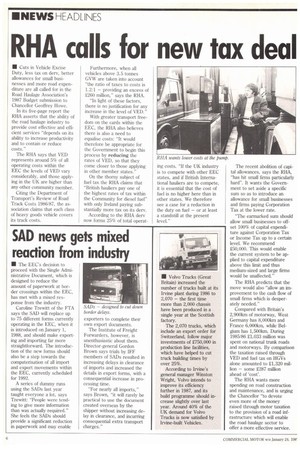RHA calls for new tax deal
Page 8

If you've noticed an error in this article please click here to report it so we can fix it.
• Cuts in Vehicle Excise Duty, less tax on derv, better allowances for small businesses and more road expenditure are all called for in the Road Haulage Association's 1987 Budget submission to Chancellor Geoffrey Howe.
In its five-page report the RHA asserts that the ability of the road haulage industry to provide cost effective and efficient services "depends on its ability to increase productivity and to contain or reduce costs."
The RHA says that VED represents around 5% of all operating costs within the EEC the levels of VED vary considerably, and those applying in the UK are higher than any other community member.
Citing the Department of Transport's Review of Road Track Costs 1986/87, the association claims that each class of heavy goods vehicle covers its track costs. Furthermore, when all vehicles above 3.5 tonnes GVW are taken into account "the ratio of taxes to costs is 1.2:1 — providing an excess of £260 million," says the RHA.
"In light of these factors, there is no justification for any increase in the level of VED."
With greater transport freedom on the cards within the EEC, the RHA also believes there is also a need to equalise costs: "It would therefore be appropriate for the Government to begin this process by reducing the rates of VED, so that they come closer to those applying in other member states."
On the thorny subject of fuel tax the RHA claims that "British hauliers pay one of the highest rates of tax within the Community for diesel fuel" with only Ireland paying substantially more tax on its derv.
According to the RHA dery now forms 25% of total operat
mg costs. "If the UK industry is to compete with other EEC states, and if British International hauliers are to compete, it is essential that the cost of fuel is no higher here than in other states. We therefore see a case for a reduction in the duty on fuel — or at least a standstill at the present level."
The recent abolition of capital allowances, says the RHA, "has hit small firms particularly hard". It wants the Government to set aside a specific sum so as to introduce an allowance for small businesses and firms paying Corporation Tax at the lower rate.
"The earmarked sum should allow small businesses to offset 100% of capital expenditure against Corporation Tax or Income Tax up to a certain level. We recommend £50,000. This would enable the current system to be applied to capital expenditure above this limit and thus medium-sized and large firms would be unaffected."
The RHA predicts that the move would also "allow an improvement to the cash flow of small firms which is desperately needed."
Compared with Britain's 2,900km of motorway, West Germany has 8,000Itm and France 6,000km, while Belgium has 1,500km. During 1985/86 21,033 million was spent on national trunk roads and motorways. By comparison the taxation raised through VED and fuel tax on HGVs alone amounted to £1,320 million — some £287 million ahead of 'cost'.
The RHA wants more spending on road construction and maintenance, and is urging the Chancellor "to devote even more of the money raised through motor taxation to the provision of a road infrastructure which will enable the road haulage sector to offer a more effective service.








































































































